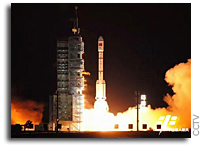China Takes Next Steps in Human Spaceflight Program

China Launches Tiangong-2 Space Laboratory Module (With video)
“China launched the Tiangong-2 space laboratory module on a Long March 2F rocket today. The two year year mission of Tiangong-2 will see two Chinese astronauts occupy the space lab for up to a month at a time to perform a variety of scientific experiments. In October, Shenzhou 11, will launch with two astronauts on the first mission to the newly commissioned space lab.”
 Keith’s note: As I said on CCTV in an earlier interview today I think that it is time that the U.S. and China started to expand their cooperation in space including human space flight. This will need to be done by Congress by ending the politically-oinspired ban that is currently in place.
Keith’s note: As I said on CCTV in an earlier interview today I think that it is time that the U.S. and China started to expand their cooperation in space including human space flight. This will need to be done by Congress by ending the politically-oinspired ban that is currently in place.
 Marc’s note: As China moves forward with its human spaceflight program should the International community and the U.S. forge closer ties with them? My position is that international cooperation in space is critical for the continual peaceful use of space, and for the commercial use of LEO, GEO, the moon and future scientific exploration beyond the moon. This then would include cooperation with China.
Marc’s note: As China moves forward with its human spaceflight program should the International community and the U.S. forge closer ties with them? My position is that international cooperation in space is critical for the continual peaceful use of space, and for the commercial use of LEO, GEO, the moon and future scientific exploration beyond the moon. This then would include cooperation with China.









I absolutely think we should bring them on-board in cooperation, particularly on some major project. Maybe they’d be interested in doing a moon base with us, or a mars mission.
Curiously enough, Chinese are bringing partners on-board for their space ventures themselves.
Chinese space program officials were quite enthusiastic about joining the ISS program a few years ago but were turned down by the US. Consequently they have focused on their own orbital lab program and extended an invitation to some of the European countries, and to Russia.
It will be interesting to see if and when they will shift their human spaceflight program to the LM-7 and other new generation launch vehicles.
I’m sure the Chinese will be very gracious towards the US, and will invite NASA to participate in a minor fashion aboard the Chinese space station. Don’t expect China to forgive previous slights easily, however…
They are nothing if not pragmatic. There is much to learn from the Chinese.
We can only learn if we are willing to communicate, and to consider that we may not yet know it all.
Economic history shows competition not cooperation drives technological progress. China never exploited any of its inventions like printing, rockets, compass, etc. because of the lack of internal and external competition. By contrast the European nations in competition against each other, and businesses within those nations in competition with each other, created the modern technological world.
All cooperation with China will do is lead to the same stagnation we see with the ISS and space in general since Project Apollo.
Exactly! Which is why NASA needs to quit fooling around and get started on their own ISS replacement. Hopefully this will be a wake up call. Fortunately, between SLS nearing flight status and the residual technology and infrastructure of ISS, it should still be possible to execute a low-cost, quick development Skylab type program before the demise of ISS, but doing so will require actual leadership. Fortunately, the current manager-in-chief will be history very soon.
NASA procedures and management practices have changed a great deal since 1970. I strongly suspect that any “low-cost, quick development” project would involve things which are now considered high risk and very inappropriate. This is like the decision to continue the Apollo 12 mission after the lightning strike during launch. By today’s standards, a similar event would result in an immediate abort.
Exactly, when NASA was in competition with Russia it was willing to take calculated risks while working to reduce them. After NASA beat Russia to the Moon they no longer had a reason to push the envelope.
What “demise”? The ISS is a modular structure. The pressure hulls won’t wear out, and the internal and external systems can be replaced as new technology becomes available.
Current planning is to end ISS in 2024. Perhaps that can be extended some, but not indefinitely.
Yes, it will fail eventually. So planning is fine, but the reality is that the ISS will stay operational until a critical system fails and is not able to be repaired, then it will be dropped into the Pacific Ocean for safety.
As to when that will happen it is difficult to say because it is a complex system.. But NASA will simply not get rid of something so expensive unless it has to.
The pressure hulls will wear out, ultimately.
http://www.cbsnews.com/news…
I can find no reference in the page you linked to the pressure hulls wearing out. Here is a quote:
“As we start getting beyond 2028, if it makes sense, and things aren’t failing at a rate that makes it difficult for us to keep up, and the country thinks it’s the right thing to do, then we can look at going beyond that.”
Perhaps the presence of a Chinese station will provide motivation required to either upgrade/repair or evolve ISS.
Or at least do anything besides make endless presentation charts about Mars missions that are never going to happen and won’t accomplish anything of economic value even if they could happen.
On the other hand based on our experiences with ISS might be difficult to make a case for another station.
There seems to be an unspoken assumption that US/China cooperation in space is up to the US. I know China has expressed some interest in cooperation in the past. I’m aware of a number of cases where they have involved Europeans (on plans for robotic lunar missions) and the United Kingdom (the Double Star magnetospheric satellites), and the list is probably longer than the few cases I know about.
But that doesn’t mean they the US has a blank check to initiate joint efforts and cooperation, as soon as a different congressman is on the appropriate committee. They might just decide dealing with us isn’t worth it. Other nations have.
I remember an effort by the Russians, to put together an international, orbital space telescope (a UV-focused successor to Hubble.) It never happened, but along the way, the US decided not to get involved, and the response was that they were relieved: The quote I remember almost literally said a US contribution wouldn’t have been worth dealing with US export/ITAR regulations. I also know some European space scientists who are dubious about working with the US, since we’ve initiated and then backed out of too many joint projects.
That’s a bold statement that I can’t agree with. It’s much too soon to say who, if anyway, will lead this century. China’s economy is in transition, their growth is slowing down, their political system might come under strain and they have yet to surpass the U.S. in space technology. That might happen or it might not happen. What would be good is if there was more cooperation with western countries.